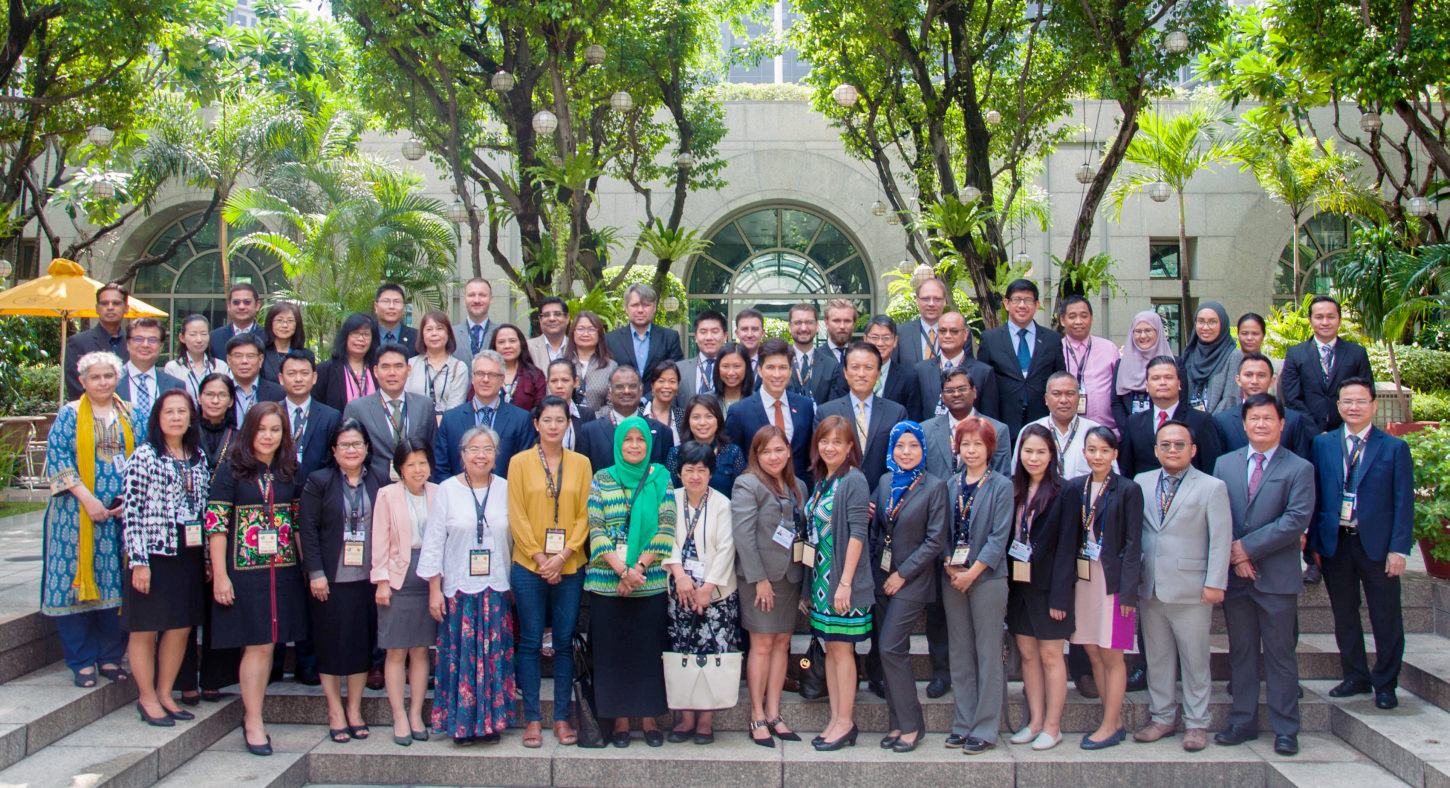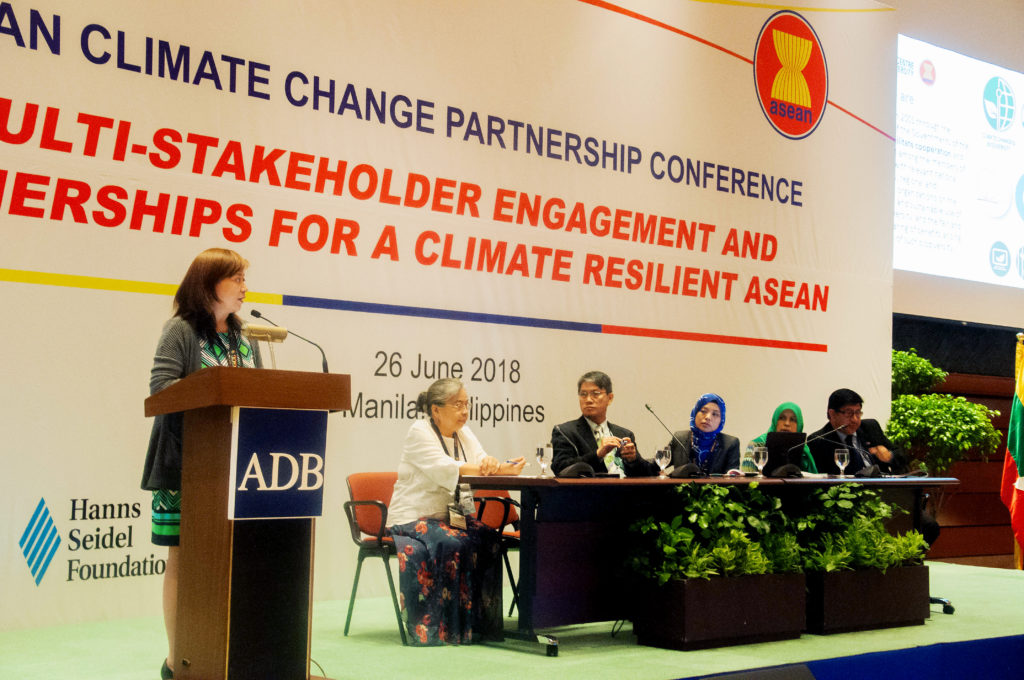Conserving ASEAN’s biodiversity crucial for climate change mitigation and adaptation

The ASEAN Centre for Biodiversity (ACB) underlined the uniqueness of biological diversity or biodiversity of the ASEAN region and its importance in undertaking climate change adaptation and mitigation during the first-ever ASEAN Climate Change Partnership Conference: Multi-stakeholder Engagement and Partnerships for a Climate Resilient ASEAN held on 26 June 2018 at the headquarters of the Asian Development Bank (ADB) in Pasig City, Philippines.
“The ASEAN region is very rich in biological resources. It is home to almost 20 percent of the world’s plants and animals, and 34 percent of the world’s coral reefs. We see biodiversity as an opportunity to leverage other activities beneficial for the region,” said Dr. Theresa Mundita S. Lim, ACB Executive Director, during the open session of the 9th ASEAN Working Group on Climate Change. The event also served as an opportunity for ASEAN sectoral bodies and development partners to showcase related activities to climate change and the thematic area they are working on.

ACB Executive Director Theresa Mundita S. Lim talks about the connection between biodiversity conservation and climate change
Dr. Lim underscored the links between biodiversity and climate change particularly the role that protection of biodiversity plays in climate change mitigation, Reducing Emissions from Deforestation and Forest Degradation (REDD), and ecosystem-based adaptation.
“Climate change is a driver of biodiversity loss, but what is taken for granted is that biodiversity management can contribute to climate change adaptation and mitigation. Biodiversity can reduce the impacts of climate change such that healthy ecosystems reduce the build-up of greenhouse gases in the atmosphere, and conserving certain species such as mangroves and drought-resistant crops can reduce impacts such as flooding and famine,” said Dr. Lim.
One of ACB’s notable efforts to combat biodiversity loss in the region is the ASEAN Heritage Parks (AHP) Programme, where protected areas uniquely representative of ASEAN’s ecosystems are given special attention in terms of enhancing management effectiveness and maintaining ecosystem functions and services.
More recently, ACB is implementing the EU-funded Biodiversity Conservation and Management of Protected Areas in ASEAN (BCAMP) Project which continues the enhancement of these AHPs. The German government-funded Protection of Biological Diversity in the ASEAN Member States in Cooperation with the ASEAN Centre for Biodiversity (CARE4BioDiv) Program, through its components: the Institutional Strengthening of Biodiversity Sector in ASEAN (ISB) project; the Small Grants Programme; and the Biodiversity-based Products as Economic Source for Nature Conservation and Livelihood Development (BBP) Project, complement these biodiversity conservation efforts with resilient livelihoods that enhance the overall adaptive capacity of communities across the ASEAN region enabling them to better cope with the challenges of a globally-warming world.
The other ASEAN sectoral bodies that presented their climate change-related activities include the Senior Officials Meeting of the ASEAN Ministers on Agriculture and Forestry (SOM-AMAF), the ASEAN Committee on Disaster Management (ACDM), the ASEAN Commission on the Promotion and Protection of the Rights of Women and Children (ACWC), the ASEAN Senior Officials Meeting on Rural Development and Poverty Eradication (SOMRDPE), and the Senior Transport Officials Meeting (STOM).
Other partner institutions and organizations that made a pitch for their climate-related activities in the ASEAN include the following: ASEAN-German Cooperation on Transport and Climate; the Economic and Research Institute for ASEAN and East Asia (ERIA); the Ministry of Environment of Japan; the Institute for Global Environmental Strategies (IGES); the International Committee of the Red Cross and Red Crescent Movement (ICRC); and the Thailand-based Climate Change International Technical and Training Center (CITC).
Key development partners of ASEAN from the various country missions from Canada, Norway, the European Union, New Zealand, Germany and the Hanns Seidel Foundation also attended the meeting.
At the close of the conference, suggestions were made to continue the activity on the sidelines of the regular meetings of the ASEAN Working Group on Climate Change.
The ASEAN Working Group on Climate Change, established in 2009 to enhance regional cooperation and action to address the adverse impacts of climate change on socio-economic development in ASEAN member-states, will continue its meeting at the ADB Headquarters from 26 to 29 June 2018.
For more information about biodiversity in the ASEAN region, log on to www.aseanbiodiversity.org.
The ACB was established in 2005 by the ASEAN Member States as a response to biodiversity loss in the region. The Centre supports and coordinates the implementation of activities in the ASEAN leading to the conservation and sustainable use of biological diversity, for the benefit of the region and the AMS.
